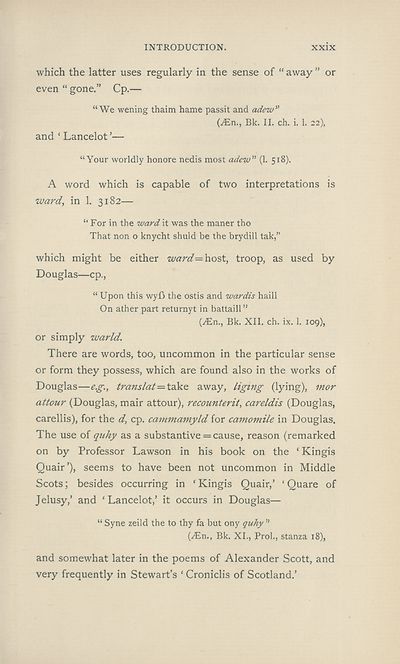Download files
Complete book:
Individual page:
Thumbnail gallery: Grid view | List view

INTRODUCTION.
xxix
which the latter uses regularly in the sense of “ away ” or
even “ gone.” Cp.—
“We wening thaim hame passit and adew”
(yEn., Bk. II. ch. i. 1. 22),
and ‘ Lancelot ’—
“Your worldly honore nedis most adew" (1. 518).
A word which is capable of two interpretations is
ward, in 1. 3182—
“ For in the ward it was the maner tho
That non o knycht shuld be the brydill tak,”
which might be either wara7 = host, troop, as used by
Douglas—cp.,
“ Upon this wyb the ostis and wardis haill
On ather part returnyt in battaill”
(JEn., Bk. XII. ch. ix. 1. 109),
or simply warld.
There are words, too, uncommon in the particular sense
or form they possess, which are found also in the works of
Douglas—e.g., translat — tdS^^ away, liging (lying), mor
attour (Douglas, mair attour), recounterit, careldis (Douglas,
carellis), for the d, cp. cammamyld for camomile in Douglas.
The use of quhy as a substantive = cause, reason (remarked
on by Professor Lawson in his book on the ‘ Kingis
Ouair’), seems to have been not uncommon in Middle
Scots; besides occurring in ‘Kingis Quair,’ ‘ Quare of
Jelusy,’ and ‘Lancelot,’ it occurs in Douglas—
“ Syne zeild the to thy fa but ony quhy ”
(iFn., Bk. XL, Pro!., stanza 18),
and somewhat later in the poems of Alexander Scott, and
very frequently in Stewart’s ‘ Croniclis of Scotland.’
xxix
which the latter uses regularly in the sense of “ away ” or
even “ gone.” Cp.—
“We wening thaim hame passit and adew”
(yEn., Bk. II. ch. i. 1. 22),
and ‘ Lancelot ’—
“Your worldly honore nedis most adew" (1. 518).
A word which is capable of two interpretations is
ward, in 1. 3182—
“ For in the ward it was the maner tho
That non o knycht shuld be the brydill tak,”
which might be either wara7 = host, troop, as used by
Douglas—cp.,
“ Upon this wyb the ostis and wardis haill
On ather part returnyt in battaill”
(JEn., Bk. XII. ch. ix. 1. 109),
or simply warld.
There are words, too, uncommon in the particular sense
or form they possess, which are found also in the works of
Douglas—e.g., translat — tdS^^ away, liging (lying), mor
attour (Douglas, mair attour), recounterit, careldis (Douglas,
carellis), for the d, cp. cammamyld for camomile in Douglas.
The use of quhy as a substantive = cause, reason (remarked
on by Professor Lawson in his book on the ‘ Kingis
Ouair’), seems to have been not uncommon in Middle
Scots; besides occurring in ‘Kingis Quair,’ ‘ Quare of
Jelusy,’ and ‘Lancelot,’ it occurs in Douglas—
“ Syne zeild the to thy fa but ony quhy ”
(iFn., Bk. XL, Pro!., stanza 18),
and somewhat later in the poems of Alexander Scott, and
very frequently in Stewart’s ‘ Croniclis of Scotland.’
Set display mode to: Large image | Zoom image | Transcription
Images and transcriptions on this page, including medium image downloads, may be used under the Creative Commons Attribution 4.0 International Licence unless otherwise stated. ![]()
| Publications by Scottish clubs > Scottish Text Society publications > New series > Lancelot of the Laik > (37) |
|---|
| Permanent URL | https://digital.nls.uk/107122620 |
|---|
| Description | A collection of over 100 Scottish texts dating from around 1400 to 1700. Most titles are in Scots, and include editions of poetry, drama, and prose by major Scottish writers such as John Barbour, William Dunbar, Gavin Douglas, and George Buchanan. Edited by a key scholarly publisher of Scotland's literary history, and published from the late 19th century onwards by the Scottish Text Society. Available here are STS series 1-3. |
|---|

